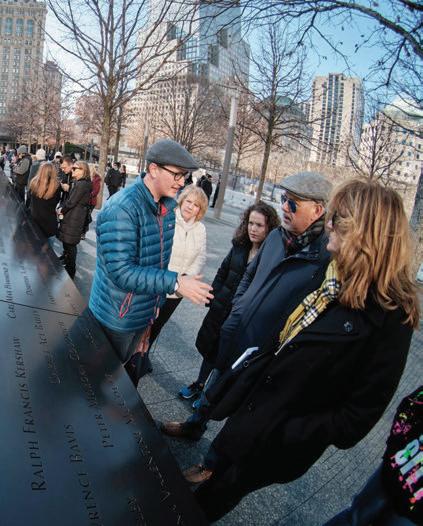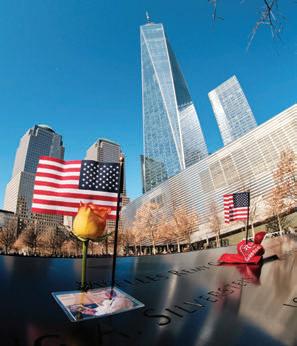
10 minute read
Timothy McGuirk’11, The Pursuit of a Meaningful Life
For nearly 365 days a year from the summer of 2018 until March 2020 Timothy McGuirk ’11 would emerge from the subway in Manhattan, cross a 16-acre plaza, and arrive at a place dedicated to remembering: the National September 11 Memorial & Museum. As the communications manager for the museum, Tim threw his “sense of duty and responsibility” into telling and preserving the stories of the 2,983 people who perished in the attacks of September 11, 2001 and February 26, 1993, helping to make it an important gathering place for families and visitors who wanted to reflect, mourn and gather strength.
Among his many duties, Tim worked closely with family members to “try to understand how they wanted the story of their loved one told.” He quickly learned that family members felt strongly about depicting how their loved one lived, rather than died – what made him or her such a special person. “That was really the core of my work – trying to answer questions, help media professionals get it right, tell it accurately, and do well by the victims and their families. You want them to feel proud; you want them to feel that their loved ones are truly never forgotten.”
Tim says it’s thanks to his experience at Portsmouth Abbey that he’s drawn to a life – and a career – of purpose and meaning, and it’s where he learned the sensitivity and grace that allowed him to navigate such delicate topics with families and visitors.
“I had four incredible years of learning, of being formed, of thinking about the kind of person I wanted to become as an adult,” he says. “My time at the Abbey was nothing short of extraordinary, and for me, it just changed the course of my life. It made me think differently about the world and understand how to become a force for good.”
After two years at the museum, he has recently moved back to Boston to take a post as the deputy director of communications for the Executive Office of Public Safety and Security (EOPSS). The city was familiar to him – he grew up in Brighton, graduated from Boston University in 2015 and worked as a communications associate at the Archdiocese of Boston. His role also invoked the same ingrained sense of duty to serve the community, which sustained him in his previous work.
“It’s important to me that I’m doing something really meaningful because that helps me to wake up every day,” Tim says. “I think about first responders, and I’m not one of them. I’ve not taken a badge, I’ve not taken an oath, but I will do anything to support those people, and I will do anything I can to help them accomplish their work in the service of our Commonwealth.”

Tim speaks with visitors to the National September 11 Memorial & Museum


Tim arrived at Portsmouth Abbey School in 2007, straight out of St. Paul’s Choir School in Cambridge, Massachusetts, a rigorous four-year environment for boys. Boarding school was not a tradition in his family, and it was a financial reach, but Tim’s parents wanted all doors open to their children.
“They were so generous with their resources and their time to give my sister and me the best opportunities,” Tim reflects. The family attended Open House in the fall of 2006 and was impressed by the Abbey’s tight-knit community and the school’s Catholic identity. “The Catholic faith is something that’s very important to me and to my family, and having the presence of the monks on the campus really made a difference,” he says. “I also really loved in subsequent visits the sense of joy that everyone brought every single day to what they were doing. Portsmouth Abbey felt really special.”
In St. Aelred’s House, Tim lived with other students from all over the world, which he considers one of his most transformative experiences. “It was extraordinary; living in a community with those guys meant the world to me.” Coming from an all-boys’ middle school to a coeducational environment, he also felt enriched by the women with whom he shared the Abbey experience. “They challenged me to think differently,” he says.
Tim is adamant that he wouldn’t have been able to attend the Abbey were it not for financial aid, which is why he feels strongly about giving back to the School. “My perspective at the Abbey was shaped by the realization that ‘I’m here through the generosity of others,’” he says.
Academically, Tim admits the Abbey was challenging, but worth the effort, and the time he spent honing his public speaking skills – giving recitations in English classes and readings in Mass – has paid off in his career. “Professionally, public speaking is important for me, especially at those sensitive and pivotal moments, whether with the museum, or now in public safety,” he says. “No better place prepared me for that than the Abbey.”
There are two monks in particular who impacted Tim’s life at the Abbey and beyond. One was his advisor for four years, Father Ambrose Wolverton. Tim was incredibly touched by the small ways Father Ambrose showed that he cared about his advisees, including sending each of them postcards from his summer travels. “He played such a pivotal role in helping me to grow during my time at the Abbey, and he modeled the kind of gentleness that I aspire to,” Tim reflects. “Father Ambrose taught me a lot about how to care for people, showing what Christ asks us to do, to love one another in that constant, gentle way. I came back to campus after I graduated and had several lunches with him, a couple of coffees. It was so meaningful, as a young man, no longer a student, to really connect with him as a friend.”
Another monk who had a profound influence on Tim is Dom Joseph Byron, who invited him to join the Order of Malta youth pilgrimage to Lourdes. As do many Portsmouth Abbey alumni, Tim continues to travel to Lourdes each summer to serve pilgrims. This past summer would have been Tim’s 13th pilgrimage had the pandemic not interfered.
Tim took the lessons and wisdom he learned at the Abbey and poured them into his job at the National September 11 Memorial & Museum. As communications manager, his job was focused on the mission of commemoration, and he helped journalists, filmmakers and visitors understand and integrate this sacred site thoughtfully in their work. He was often tasked with approving filmmakers’ requests for access to the museum, which includes 16 acres of open space – a rare phenomenon in dense Manhattan.
Tim and his teammates had to make daily judgment decisions, i.e., Does this script align with our core mission to remember and honor the victims? He was also present on site to monitor filming staff and ensure the museum was properly respected. A team player, Tim worked hard to improve internal communications among the staff and bridge the gap between teams. “My boss did a lot of coaching for me on values,” he notes, “always aligning our work to mission. That’s how the Memorial shaped me.”
One aspect of the job that Tim found fascinating was the frequent appearance of world leaders, specifically when heads of state gathered in New York City for the United Nations General Assembly. One memorable visit was from the king and queen of Belgium. “It was very regal,” says Tim. “These are the last Catholic monarchs in the world, so as a Catholic, that was a very memorable thing.” According to Tim, the best day of the year – albeit the hardest – was the 9/11 anniversary when the names of the 2,983 victims were read. The list includes the six victims from the attack on February 26, 1993, as well as those who were killed on September 11, 2001, at the Pentagon, in the field near Shanksville, PA, where Flight 93 crashed after being hijacked, and at the World Trade Center. “That number really sticks with me,” Tim attests. “It makes a big difference for family members to know that you are consciously remembering each individual life that was taken that day. There’s such power in reading a name.” Although the anniversary is a closed ceremony, Tim was on site to manage the press. “Most people will never experience the privilege I had, being on the Plaza,” Tim explains.

Tim also cherishes his memories of his quiet moments on the Plaza. “You feel personally challenged to think about what you’re doing,” he says. “No one else is around. You’re not talking with anybody about it, but you just have these moments where you stand back and you look at the pools, and it affects you. It’s possible to become numb, when you are working there every single day, but there are certain things that draw that emotion out of you, and it’s so rewarding when that happens.”
Once the pandemic hit, Tim’s life was turned upside down, and he was furloughed from the museum. Fortunately, he quickly found his current position with EOPSS in Boston. The move back to Boston also allowed him to once again live in the same city with his fiancé, Grace, who is now his wife.
Tim’s post as deputy director of communications at EOPSS supports 14 government agencies whose missions were shaped by the attacks of September 11. His work

developing external communications has renewed his appreciation for safety professional’s commitment to information sharing, counterterrorism, and day-to-day community engagement. When a journalist submits an inquiry, it is up to Tim and his team to be responsive and transparent about how the agencies fulfill their unique mandates.
Newly married in the midst of the COVID-19 quarantine, Tim is thankful for the emphasis on routine and order that was imbued in him while living on the Abbey campus. “For the first time in my life, I had that 24/7 comprehensive sense of routine,” he says. “I think that’s a huge Benedictine ideal, right? From the moment you wake up to the end your day, your day is planned as a student, for better or worse.” In addition to a finely-honed sense of order, another Benedictine principle that Tim has carried with him from the Abbey is the notion of hospitality. “One of the things that my wife and I have talked a lot about is having a home that is very open to people, where people are always welcome to come,” he says. “I truly learned it from the monks. The monks always threw great parties; they really encouraged us to be festive and to be joyful.”
Still in his twenties, Tim is staying open to what the future holds for him. His advice to fellow Ravens striving for focus during troubling times: “Work hard. Listen. I know the Rule of St. Benedict opens with that word. Really listen to
people. Listen to their perspectives and their experiences. And, finally, be thankful. Gratitude just transforms your life; I have experienced that. I think of my parents, for whom I am very thankful. I feel grateful for the teachers that I had. That gratitude is the only thing getting me through this, because this has been really hard.”
– Kathy Heydt
Tim and Grace, back in Boston












